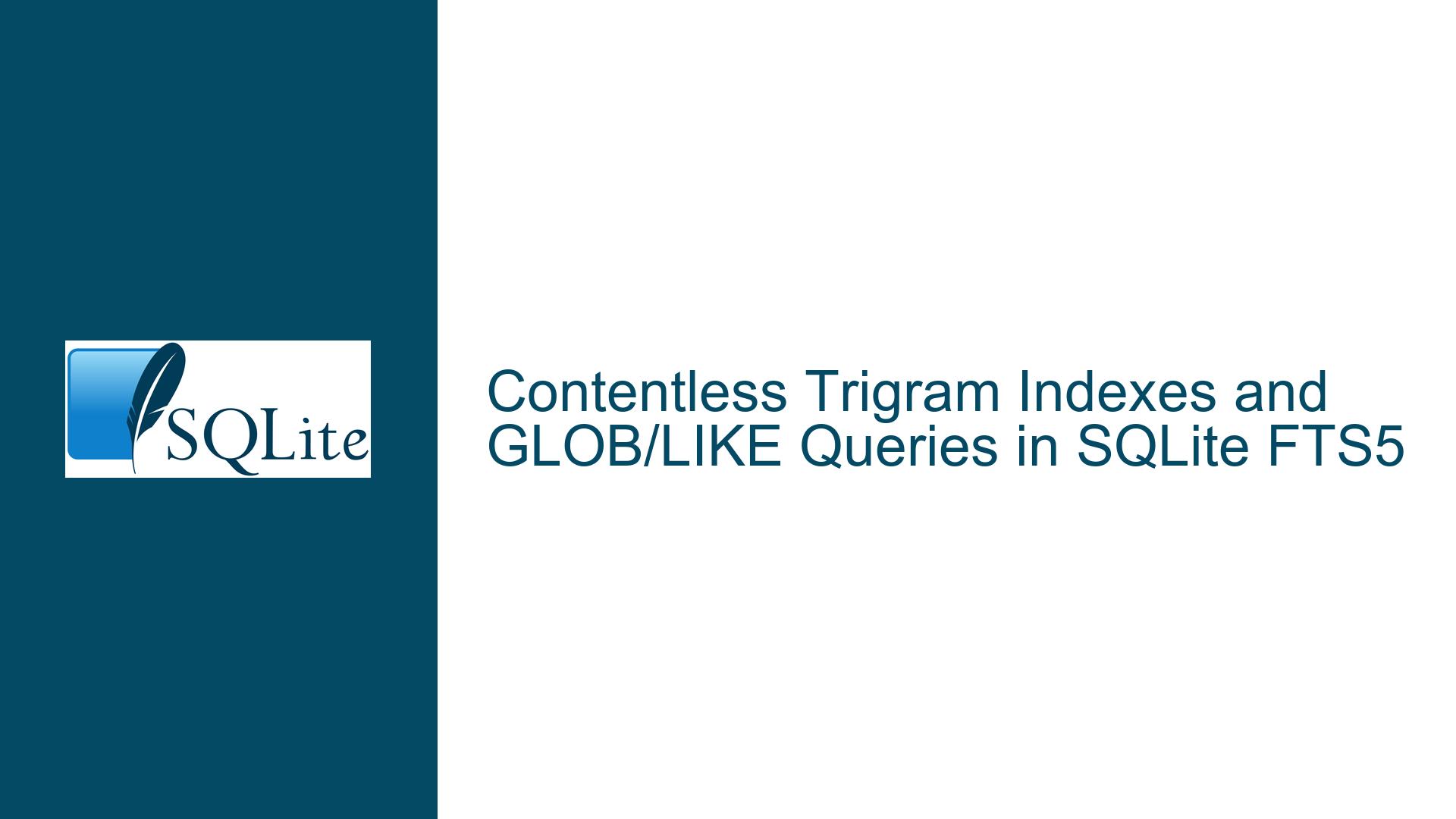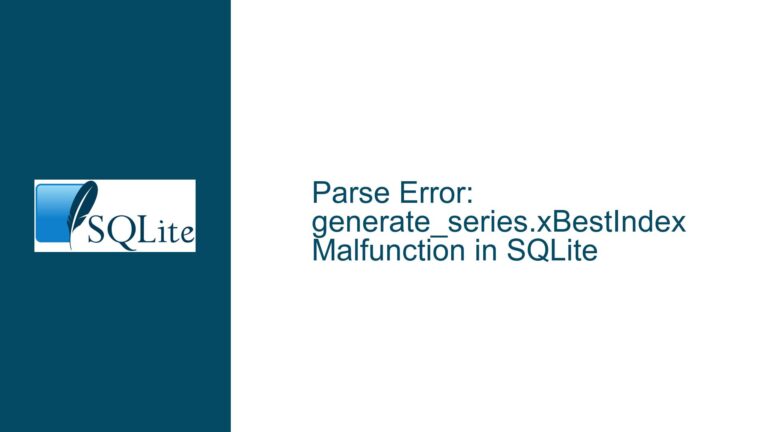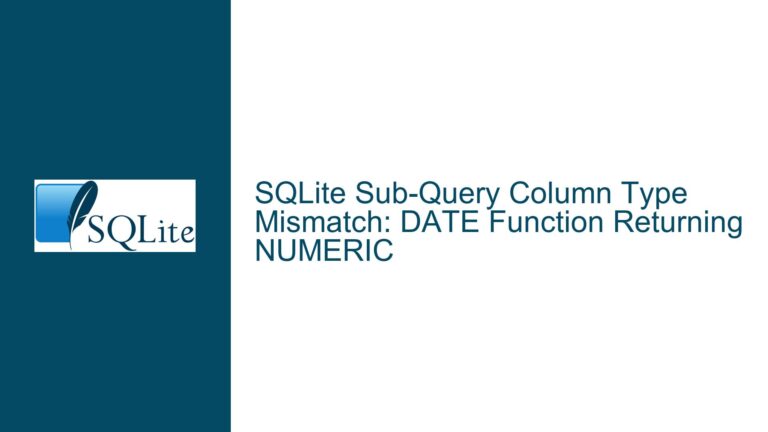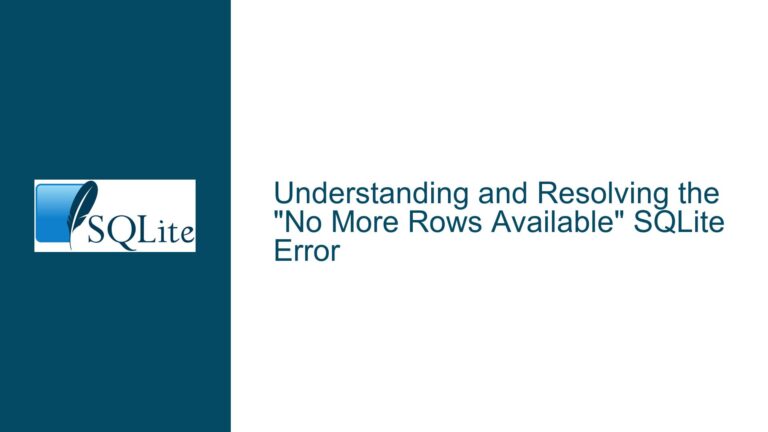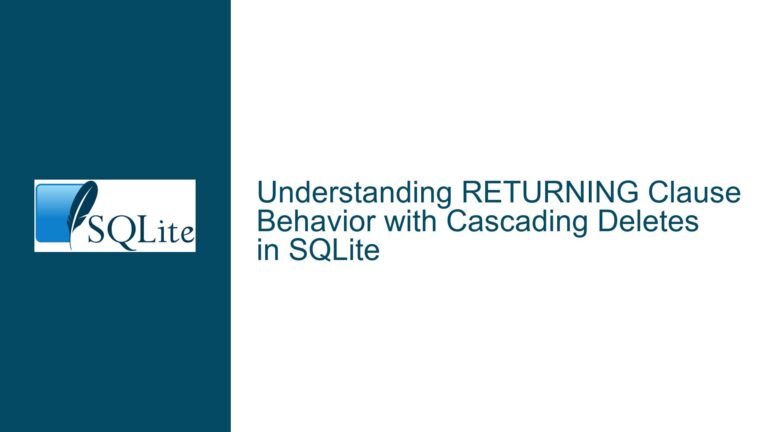Contentless Trigram Indexes and GLOB/LIKE Queries in SQLite FTS5
Understanding Contentless Trigram Indexes and FTS5 Behavior
Contentless trigram indexes in SQLite’s FTS5 (Full-Text Search 5) module are designed to optimize text search operations by breaking down text into sequences of three characters (trigrams). These indexes are particularly useful for speeding up pattern matching operations, such as those involving LIKE or GLOB queries. However, the behavior of these indexes, especially when combined with contentless tables (content=''), can be counterintuitive and lead to unexpected results.
In a contentless FTS5 table, the actual text content is not stored within the FTS5 index itself. Instead, the index only stores the trigrams and their positions, which allows for efficient searching without duplicating the source data. This design is beneficial for scenarios where storage efficiency is critical, such as indexing large datasets like source code repositories. However, the absence of the actual text content introduces limitations when performing certain types of queries, particularly those involving LIKE and GLOB operators.
The core issue arises when attempting to use LIKE or GLOB queries on a contentless trigram index. While these operators are designed to work with wildcard patterns, their functionality is constrained by the underlying FTS5 implementation. Specifically, FTS5 relies on the presence of non-wildcard character sequences to narrow down the search space. When such sequences are absent or when the index is contentless, FTS5 may fail to return the expected results, even if the pattern logically matches the indexed data.
Why GLOB and LIKE Queries Fail with Contentless Trigram Indexes
The failure of GLOB and LIKE queries in contentless trigram indexes can be attributed to several factors, each rooted in the design and implementation of FTS5. Understanding these factors requires a deep dive into how FTS5 processes queries and interacts with contentless tables.
First, FTS5 uses the trigram index to identify potential matches based on the presence of specific character sequences. For example, a query like GLOB 'post to rem*' relies on the trigram index to locate rows containing the sequence "pos", "ost", "st ", "t t", "to ", "o r", " re", and "rem". However, the index alone cannot definitively determine whether a row matches the full pattern, as it only provides a subset of potential matches. This subset often includes false positives, which must be filtered out by evaluating the actual text content against the GLOB or LIKE expression.
In a contentless table, the actual text content is not available for this final filtering step. As a result, FTS5 cannot verify whether a row truly matches the pattern, leading to the exclusion of all rows from the result set. This behavior is particularly problematic for patterns that rely heavily on wildcards, as the absence of non-wildcard sequences prevents FTS5 from narrowing down the search space effectively.
Additionally, the SQLite API imposes constraints on how virtual tables like FTS5 interact with other components of the database engine. Specifically, the API does not provide a straightforward mechanism for FTS5 to communicate the exact set of matching rows to the query planner. This limitation makes it difficult to implement optimizations that would allow FTS5 to fully leverage the trigram index for GLOB and LIKE queries.
Resolving GLOB and LIKE Query Issues in Contentless Trigram Indexes
To address the limitations of GLOB and LIKE queries in contentless trigram indexes, several strategies can be employed, each with its own trade-offs. These strategies range from modifying the query patterns to restructuring the database schema or even extending SQLite’s functionality through custom extensions.
One approach is to ensure that GLOB and LIKE patterns include sufficient non-wildcard sequences to enable FTS5 to narrow down the search space effectively. For example, rewriting the query GLOB 'post to rem*' as GLOB '*post to rem*' increases the likelihood of FTS5 identifying relevant rows. However, this approach is not foolproof, as it still relies on the availability of the actual text content for final filtering.
Another strategy is to avoid using contentless tables altogether and instead store the text content within the FTS5 index. This approach eliminates the need for final filtering by ensuring that the actual text content is available for evaluation. While this increases storage requirements, it provides a more robust solution for scenarios where GLOB and LIKE queries are essential.
For advanced use cases, such as indexing large datasets like source code repositories, custom extensions can be developed to enhance FTS5’s functionality. These extensions can implement specialized algorithms for pattern matching, leveraging the trigram index to perform efficient searches without relying on the actual text content. However, developing and deploying such extensions requires significant expertise and may introduce compatibility issues across different platforms and environments.
In conclusion, while contentless trigram indexes offer significant storage and performance benefits, their limitations with GLOB and LIKE queries must be carefully considered. By understanding the underlying mechanisms and exploring alternative strategies, developers can overcome these limitations and unlock the full potential of SQLite’s FTS5 module.
